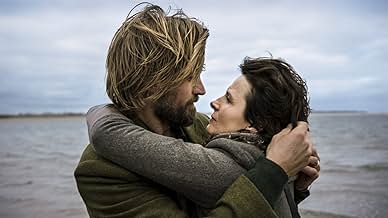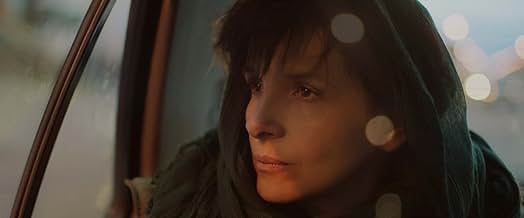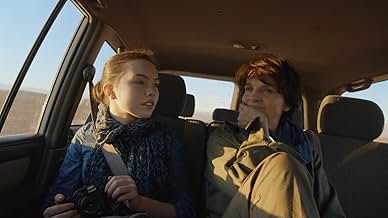AVALIAÇÃO DA IMDb
7,0/10
8,4 mil
SUA AVALIAÇÃO
Rebecca é uma das melhores fotógrafas de guerra do mundo. Ela deve resistir a uma tempestade emocional quando o marido se recusa a suportar a sua vida perigosa por mais tempo.Rebecca é uma das melhores fotógrafas de guerra do mundo. Ela deve resistir a uma tempestade emocional quando o marido se recusa a suportar a sua vida perigosa por mais tempo.Rebecca é uma das melhores fotógrafas de guerra do mundo. Ela deve resistir a uma tempestade emocional quando o marido se recusa a suportar a sua vida perigosa por mais tempo.
- Direção
- Roteiristas
- Artistas
- Prêmios
- 6 vitórias e 14 indicações no total
Zoubida Akif
- Ariana
- (as Zoubida Afik)
Avaliações em destaque
I saw this at The Heartland Film Festival in Indianapolis this weekend. It's been 24+ hours since the movie ended, and it's themes are still with me. The horror of war..the difficulty balancing passion and pragmatism...what do children need from their parents... My mind changed such that the final take away is the theme of the film. Life is difficult and decisions have consequences. I want to have coffee with Rebecca and shake her. Tell her how much her children and husband need her..Tell her the sacrifice isn't worth it. Atrocities will continue. Taking pictures of suicide bombers does glamorous the cause. Taking pictures of deceased Africans doesn't bring them to life. Why are you so angry? For these reasons, I must recommend this film. It is not only well acted, but it creates and stirs up emotions, makes you think. Some time more than entertainment is demanded from a film.
War photographer Rebecca (Juliette Binoche) is one of the best at her job, obtaining the kind of pictures that invariably get published in western magazines as examples of the violence of conflicts in nonwestern areas such as Afghanistan or Kenya. The only snag is that Rebecca is so obsessed with her work that she cannot understand the damage she is doing to her family back in Ireland, especially her daughter Steph (Lauryn Canny).
The conflict between personal and professional values forms the kernel of Erik Poppe's film. Yet thematically speaking the director is far more interested in prompting reflection on the photographer's trade. While Rebecca certainly shows a good deal of bravery in trying to get the best pictures, we also understand that she is something of a voyeur who actively enjoys intruding into her subjects' personal space. Her fondness for the close-up of suffering people is quite disconcerting, especially in a sequence taking place in the back of an SUV in Afghanistan. In political terms, she adopts a neocolonialist position of the westerner taking scopophilic pleasure in the power she exerts through her camera.
Perhaps the film's most telling moment occurs back in Ireland, when Steph turns the camera on Rebecca and photographs her repeatedly. Rebecca cannot endure the experience of the lens pointing at her in such an intense manner and turns her head away, her eyes filling with tears. Would that Rebecca might understand that her subjects could feel much the same; but if she did so, then she would not be good at her job.
Given the integrity with which Poppe examines this issue, it's rather sad that the film as a whole should be somewhat melodramatic. In the end the action descends into something of a tug-of-love battle between mother and family; at one point Rebecca bundles Steph and her younger sister Lisa (Adrianna Cramer Curtis) in a pathetic attempt to abduct them from their family home. Needless to say husband Marcus (Nikolaj Coaster-Waldau) foils the plot and eventually looks after the girls himself.
The film makes a half-hearted attempt to draw a parallel between Rebecca's wanderlust and the rhythms of the tide (her daughter observes that the photographer is like the sea, coming and going), but unfortunately outstays its welcome: the last half-hour unfolds slowly but predictably towards an inevitable denouement. This is a shame, given the seriousness of its basic premise - almost as if director Poppe had lost the courage of his convictions.
The conflict between personal and professional values forms the kernel of Erik Poppe's film. Yet thematically speaking the director is far more interested in prompting reflection on the photographer's trade. While Rebecca certainly shows a good deal of bravery in trying to get the best pictures, we also understand that she is something of a voyeur who actively enjoys intruding into her subjects' personal space. Her fondness for the close-up of suffering people is quite disconcerting, especially in a sequence taking place in the back of an SUV in Afghanistan. In political terms, she adopts a neocolonialist position of the westerner taking scopophilic pleasure in the power she exerts through her camera.
Perhaps the film's most telling moment occurs back in Ireland, when Steph turns the camera on Rebecca and photographs her repeatedly. Rebecca cannot endure the experience of the lens pointing at her in such an intense manner and turns her head away, her eyes filling with tears. Would that Rebecca might understand that her subjects could feel much the same; but if she did so, then she would not be good at her job.
Given the integrity with which Poppe examines this issue, it's rather sad that the film as a whole should be somewhat melodramatic. In the end the action descends into something of a tug-of-love battle between mother and family; at one point Rebecca bundles Steph and her younger sister Lisa (Adrianna Cramer Curtis) in a pathetic attempt to abduct them from their family home. Needless to say husband Marcus (Nikolaj Coaster-Waldau) foils the plot and eventually looks after the girls himself.
The film makes a half-hearted attempt to draw a parallel between Rebecca's wanderlust and the rhythms of the tide (her daughter observes that the photographer is like the sea, coming and going), but unfortunately outstays its welcome: the last half-hour unfolds slowly but predictably towards an inevitable denouement. This is a shame, given the seriousness of its basic premise - almost as if director Poppe had lost the courage of his convictions.
Juliette Binoche is one of the finest actresses of the past few decades. None of her beauty and vividness have faded with the advancing years. She brings to this role, as with all of her other roles a lot of heartfelt emotion. She plays a war photographer who is at war with herself about her family responsibilities versus her commitment to her dangerous occupation.
Nicolas Costas Waldau is brilliant as her husband. A much more appealing character than his Game of Thrones one. The young actresses who play her daughters are also wonderful.
One thing I will say is that it's frustrating to watch her put herself in immediate danger. Especially seeing as she has such an idyllic home life with such a beautiful husband, children and a nice cottage in rural Ireland. I won't spoil it for you. It is a wonderful movie, if a little frustrating.
Nicolas Costas Waldau is brilliant as her husband. A much more appealing character than his Game of Thrones one. The young actresses who play her daughters are also wonderful.
One thing I will say is that it's frustrating to watch her put herself in immediate danger. Especially seeing as she has such an idyllic home life with such a beautiful husband, children and a nice cottage in rural Ireland. I won't spoil it for you. It is a wonderful movie, if a little frustrating.
I came into the movies with an open mind, without any knowledge of either the plot, setting or premise of the movie. The opening left me mesmerized, starting off with a silent photographer documenting a ceremonial initiation of a suicide bomber, to later become hurt in the subsequent IED attack. The following complications and insight to the photographer's life really builds up a powerful and emotional drama that mostly plays out within the borders of her own home.
From the reaction of her husband to their children's acceptance of their mother's dangerous occupation, every scene feels truly genuine. In addition to being a perfectly acted and directed movie, the cinematography is, to say the least, absolutely astonishing and beautiful. From start to end, the movie feels like a beautiful painting, with no expense spared on the details.
The most refreshing feature of this particular movie is the way the story is delivered, in a non-predictable fashion freed from the basic "Hollywood-recipe". To say the least, this is by far one of the best European movie released in years, and I am yet to see a movie this original, captivating, refreshing and complex from Hollywood. 10/10 stars, absolutely a must-see for all movie enthusiasts that appreciate something else than recycled, brain-dead black and white portraits of reality that Hollywood keeps producing.
From the reaction of her husband to their children's acceptance of their mother's dangerous occupation, every scene feels truly genuine. In addition to being a perfectly acted and directed movie, the cinematography is, to say the least, absolutely astonishing and beautiful. From start to end, the movie feels like a beautiful painting, with no expense spared on the details.
The most refreshing feature of this particular movie is the way the story is delivered, in a non-predictable fashion freed from the basic "Hollywood-recipe". To say the least, this is by far one of the best European movie released in years, and I am yet to see a movie this original, captivating, refreshing and complex from Hollywood. 10/10 stars, absolutely a must-see for all movie enthusiasts that appreciate something else than recycled, brain-dead black and white portraits of reality that Hollywood keeps producing.
A film about a female investigative journalist is bound to raise a reaction among viewers, especially when the atrocities filmed are so brutal. But that is the point being made by writer/director Erik Poppe (with added written material by Harald Rosenløw-Eeg and Kirsten Sheridan). The main character in this story is Rebecca (a radiant and brilliant Juliette Binoche), one of the world's top war photographers. She must weather a major emotional storm when her husband Marcus (Nikolaj Coaster-Waldau) refuses to put up with her dangerous life any longer. He and their young daughters – especially Steph (Lauryn Canny) but also the much younger Lisa (Adrianna Cramer Curtis) - need Rebecca, who, however, loves both her family and her work. Rebecca has been angry, since a child, over the way people around the globe focus on the detritus of local news and pay little attention to the horrors that occur daily in the countries besieged by terror. Rebecca resolves to take Steph (at Steph's request) to Kenya where inadvertently they witness terrorist acts even though Rebecca had been promised the area was safe. The result of Rebecca's endangering her daughter results in her marriage dissolving, but other changes in Rebecca's smoldering anger and angst result also.
The film is very well photographed and both Binoche and Coaster-Waldau are excellent. The supporting cast is strong (especially a very small bit part for Maria Doyle Kennedy) and the musical score by Armand Amar is deeply moving. The film places before us the incalculable struggles war correspondents face but at the same time it brings to out attention just how impossibly difficult life in troubled countries can be. Grady Harp December 14
The film is very well photographed and both Binoche and Coaster-Waldau are excellent. The supporting cast is strong (especially a very small bit part for Maria Doyle Kennedy) and the musical score by Armand Amar is deeply moving. The film places before us the incalculable struggles war correspondents face but at the same time it brings to out attention just how impossibly difficult life in troubled countries can be. Grady Harp December 14
Você sabia?
- Curiosidades"A thousand time goodnight" is a line from William Shakespeare's Romeo and Juliet.
- Erros de gravaçãoWhen Rebecca and Marcus are walking hand in hand on the beach after drinking wine with his colleagues, the second shot is a frontal medium shot. In the upper left part of the shot, the sound operator's boom microphone is briefly, but clearly visible.
Principais escolhas
Faça login para avaliar e ver a lista de recomendações personalizadas
- How long is 1,000 Times Good Night?Fornecido pela Alexa
Detalhes
- Data de lançamento
- Países de origem
- Centrais de atendimento oficiais
- Idiomas
- Também conhecido como
- 1,000 Times Good Night
- Locações de filme
- Empresas de produção
- Consulte mais créditos da empresa na IMDbPro
Bilheteria
- Orçamento
- € 5.284.200 (estimativa)
- Faturamento bruto nos EUA e Canadá
- US$ 53.895
- Fim de semana de estreia nos EUA e Canadá
- US$ 24.120
- 26 de out. de 2014
- Faturamento bruto mundial
- US$ 2.549.568
- Tempo de duração
- 1 h 57 min(117 min)
- Cor
- Mixagem de som
- Proporção
- 2.35 : 1
Contribua para esta página
Sugerir uma alteração ou adicionar conteúdo ausente





























